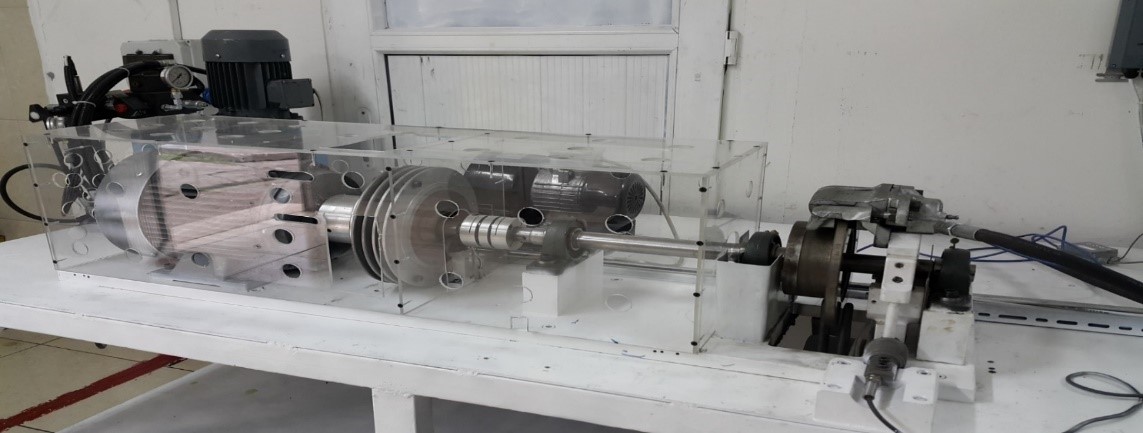Apetech owns latest technological equipment in all areas.
Apetech Central Laboratory built over 380m² indoor area conducts;
- Project based product development,
- Raw material, semi product and product tests,
- New formula analyses
Apetech Central Labs serves around the clock with 15 staff members.
ECE-R 90
ECE-R 13
Vehicle Tests
Krauss Test
Compression Test
Shear Test
Tests:
Hardness test: For measurement of hardness we use “Macrona Shore D” hardness measurement device and “Macrone Shore D test stand” device.
Mechanical structure of the pads is checked with hardness measurement test as specified in SAE J-661.
Hardness measurement tests are done for checking each produced party. During the measurements, at least nine hardness measurements are made over the pad in different areas for each batch and the average of the measurements is checked for compliance to SAE J-661 criteria.
Density measurement test: Each produced party is checked with density measurement test using "Radwag PS 360.R2" precision scale and “Density Kit (Kit 128)" test device.
By keeping in water and grease for 24 hours and making hardness and weight measurements before and after the process, the density is measured according to Archimedes principle. Hardness and density values are checked for compliance with the values stipulated by SAE J-661 international standard.
Bending test: In order to determine bending strength of spoon shaped pads, three-point bending test is done to check each party. Thus bending strength of the pads during disc braking is found.
Thermal Conductivity (ASTM 1114-98) Test: In order to determine thermal conductivity we use “C-Therm TCİ Thermal Conductivity Measurement” device. Produced brake pads are checked by determining thermal conductivity with this device.

Shear strength test: We use “HY201 100KN Shear Strength Tester” device to measure shear strength. Shear strength tests of the produced pads are done according to ISO 6312 standard. In order to control connection between the disc plate and the pad, shear strength of the pads in each party is measured. The force that separates pad from the plate shall be at least above 350N/cm2 for safe use of the pad. Additionally at least 80% of the pad plate surface shall remain on the pad.
Compressibility Test: For compressibility test we use “HY205 Compressibility Tester” test device. Compressibility test of the produced pads are done according to ISO 6310-2009 standard.
By applying 160 bar pressure on the pad at room temperature and at 400C, the compression is measured. Expansion and heat transfer are also examined.
High compression means soft pad and problem with respect to feeling the pedal.
Low compression means the pad is hard and has risk of causing noise.
Compressibility to thickness ratio.
At 400C: <%5
At room temperature: <%2

Krauss test: For Krauss test we use “JF55 Multi-Function Friction Tester - Krauss Tester” test device. It is used to check pad friction coefficients and abrasion during R&D process and mass production after pad development is completed. Each party is checked with Krauss test.
Test standards: Krauss, PV3212, PV3211, ECE R90.
High Performance Wear Test Device: We use “Wear Test Device” to determine wearing coefficient. This is the test where wear in mm and grams are measured for pad and disc/drum depending on the conditions of and temperature. These tests shall result in wearing coefficient values requested by SAE J-661 international standard.
Original disc brake pads are the pads used in the initial assembly of the vehicle. All pads to be used later, either in authorised services or independent renewal market shall be parts defined as original or equivalent. Therefore equivalent pads shall be tested and approved according to ECE R90 regulation. Furthermore, the factory where the pads are produced shall be tested for COP (Conformity of Production) every year.

In Apetech Automotive, we have the tests within the scope of ECE R90 from Germany and Luxemburg and approve our pads and obtain E1 - E13 ECE R90 number. Our factory also undergoes COP (conformity of Production) tests and analysis and is approved every year.
E1 and E13 numbers given by authorities are the document that our pads provide the same performance as the original.








